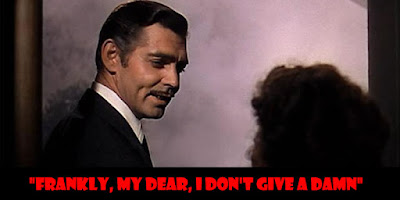Except for the two years I lived in a college dormitory, I have rarely been around people who swore habitually. My family, my friends and, for the most part, my work associates have rarely used profane or obscene language.
Most of my exposure to such language has come through novels, movies and, increasingly, television. Yet I recall so many great novels, movies and TV shows in which bad language was nonexistent, or in the case of Gone with the Wind, virtually so. The absence of crude language may have sometimes actually been a significant factor in their success. I recall how the television comedy Seinfeld used such words as "master of my domain" and "shrinkage" to avoid crude language, thus creating classic episodes.Rarely have I mentioned the bad language in the novels I review here, although I did on Aug. 14 when I called Lee Smith's Silver Alert a "surprisingly potty-mouthed novel." The only other book by Smith I had read was her memoir Dimestore, from which I got the picture of her as an elegant, older Southern lady. So I didn't expect cover-to-cover cursing in the novel. Some of her characters might be expected to swear, making their language choices more understandable, yet even Smith's narration was curse-filled. What made this even more surprising was that her story will appeal mainly to older readers, especially older women, the very people most likely to be repelled by such language. What did Smith hope to gain by this?
The television show Gutfeld! bleeps out most of the obscenities, often leading to sentences where so many words are bleeped that the TV audience has to guess not just what words are being spoken but also what point is being made. Is this an argument for not bleeping bad language? No, it's an argument for avoiding language that must be bleeped.
Timothy Jay, a college professor, was quoted in The Wall Street Journal as saying, "People who have better vocabularies, which is related to intelligence and education, are better at swearing." True or not, this makes little sense to me. Better vocabularies should mean better alternatives to crude words. And the fact that those same Gutfeld! guests refrain from swearing when they appear on other television programs demonstrates that they know other ways of making the same points.
The headline on that Journal article, published last April, was "Curses! Why All The Crude Talk?" I pose the same question.

No comments:
Post a Comment